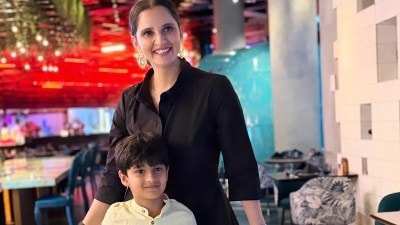Rabuka holds out olive branch for rebels
Suva, May 22: Fiji's President tried to draw armed rebels occupying Parliament closer to peaceful surrender today, saying the current gove...

Suva, May 22: Fiji8217;s President tried to draw armed rebels occupying Parliament closer to peaceful surrender today, saying the current government might be replaced even if the coup attempt fails.
President Ratu Sir Kamisese Mara8217;s comments seemed aimed at presenting a conciliatory approach to ethnic Fijian rebels, who have been holding the Indian-dominated government hostage since storming Parliament on Friday.
Ratu Mara said he would hold talks with the government once the coup attempt ends, but he refused to guarantee that a failure of the coup would automatically bring back the democratically elected government.
quot;We will have a dialogue and see what they offer,quot; he said. quot;I cannot say I will put back the government that has caused all these problems.quot;
The comments offered the rebels possibility of achieving a major goal of their uprising: the ousting of the government.
Ratu Mara sent a letter to coup leader George Speight last night promising to address concerns of ethnic Fijians, pledging that quot;the position of the indigenous community will be protected and enhanced.quot;
The President said he had a plan to end the standoff which would be presented tomorrow to Fiji8217;s influential Great Council of Chiefs, an association of tribal leaders.
quot;Our main objective is to see that no blood is spilled,quot; he said.
Much will depend on the tribal meeting tomorrow. Speight said today he would quot;retirequot; if the council does not back his coup attempt.
In a sign today of rising tension inside Parliament, rebels dragged elected Prime Minister Mahendra Chaudhry out of Parliament and put a gun to his head, Speight deputy Ratu Timoci Silatolu was quoted as saying by local website Fijilive.com.
Silatolu said threat to Chaudhry8217;s life was made because of rumours that outside forces would intervene to end the four-day standoff, Fijilive.com reported.
Police tightened security around Suva8217;s parliament complex today, stopping news crews at checkpoints about one km away and searching vans delivering food and other supplies.
The situation grew more tense yesterday, when Ratu Mara rejected Speight8217;s request for direct talks, and accused him of threatening to kill the captives if his demands for control of the country are not met.
Speight denied the allegation, saying his uprising was a civilian coup, not an act of terrorism.
Public backing for the rebels has been scant. Speight received his first public statement of support from the nationalist Taukei Movement and main opposition party yesterday, only to have movement leader Apisai Tora dissociate himself from the coup the next day.
Speight, accompanied by a police escort, ventured out of Parliament today morning to assess the damage wreaked on Suva by rioting on Friday that followed the coup attempt.
Meanwhile, Fiji8217;s capital came to a standstill today as troops took up key positions and large crowds gathered in support of a coup attempt by indigenous Fijians linked to the military.
Shops, banks and schools were closed and supporters of the coup were milling around at a market where a violent protest march erupted on Friday.
There were few signs that Prime Minister Mahendhra Choudhry and some 35 legislators, held hostage by gunmen, were likely to be released any time soon.
Former Fijian Prime Minister and army strongman Sitiveni Rabuka added to the confusion today when he said he quot;sympathisedquot; with the gunmen and quit as chief mediator between the rebels and President Ratu Sir Kamisese Mara, who has vowed to uphold the 1997 constitution.
quot;I sympathise with your cause. I do not agree with your methods,quot; Rabuka told state-owned Fiji TV, referring to the gunmen.
Rabuka, who led two coups in 1987, was defeated by Chaudhry in elections a year ago. He has continued to assert strong political influence based on his popularity as an indigenous leader.
His comments further complicated the already muddy situation in Fiji, with doubts emerging over who is leading the coup and where the security forces8217; allegiances really lie.
Police and the military chiefs have pledged their loyalty to the constitution and the state under respected elder statesman Mara, who has assumed executive powers to deal with the crisis.
But it is now clear the coup is being led by hardcore elements of a special forces army group called the Counter Revolutionary Warfare Unit CRWU, which Rabuka has said trained on his property earlier this year.
Mara has said he would not negotiate with hostage takers.
Rabuka also revealed the CRWU unit is not taking orders from nominal coup leader George Speight, an indigenous Fijian businessman and the son of an opposition MP.
quot;They are listening to the old man, he is their leader,quot; he said.
The quot;old manquot; is a military term for the unit8217;s commander, a currently unknown officer. It is also unclear whether the unit8217;s commander is acting alone or under orders.
- 01
- 02
- 03
- 04
- 05






























